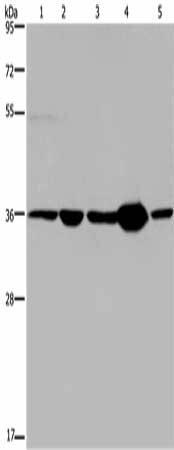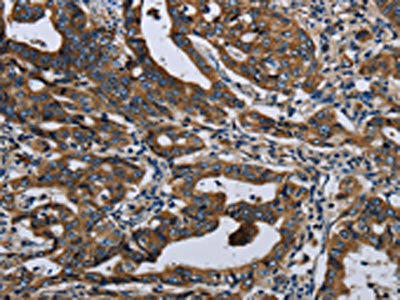Description
| Antibody Name: | LZTFL1 Antibody (PACO16640) |
| Antibody SKU: | PACO16640 |
| Size: | 50ul |
| Host Species: | Rabbit |
| Tested Applications: | ELISA, WB, IHC |
| Recommended Dilutions: | ELISA:1:2000-1:5000, WB:1:500-1:2000, IHC:1:50-1:200 |
| Species Reactivity: | Human, Mouse, Rat |
| Immunogen: | Fusion protein of human LZTFL1 |
| Form: | Liquid |
| Storage Buffer: | -20°C, pH7.4 PBS, 0.05% NaN3, 40% Glycerol |
| Purification Method: | Antigen affinity purification |
| Clonality: | Polyclonal |
| Isotype: | IgG |
| Conjugate: | Non-conjugated |
 | Gel: 8%SDS-PAGE, Lysate: 40 μg, Lane 1-5: Human transitional cell carcinoma tissue, 293T cells, A172 cells, human testis tissue, Hela cells, Primary antibody: PACO16640(LZTFL1 Antibody) at dilution 1/550, Secondary antibody: Goat anti rabbit IgG at 1/8000 dilution, Exposure time: 20 seconds. |
 | The image on the left is immunohistochemistry of paraffin-embedded Human gastic cancer tissue using PACO16640(LZTFL1 Antibody) at dilution 1/50, on the right is treated with fusion protein. (Original magnification: x200). |
| Background: | This gene encodes a ubiquitously expressed protein that localizes to the cytoplasm. This protein interacts with Bardet-Biedl Syndrome (BBS) proteins and, through its interaction with BBS protein complexes, regulates protein trafficking to the ciliary membrane. Nonsense mutations in this gene cause a form of Bardet-Biedl Syndrome; a ciliopathy characterized in part by polydactyly, obesity, cognitive impairment, hypogonadism, and kidney failure. This gene may also function as a tumor suppressor; possibly by interacting with E-cadherin and the actin cytoskeleton and thereby regulating the transition of epithelial cells to mesenchymal cells. Alternative splicing of this gene results in multiple transcript variants. |
| Synonyms: | leucine zipper transcription factor-like 1 |
| UniProt Protein Function: | LZTFL1: Belongs to the LZTFL1 family.Chromosomal Location of Human Ortholog: 3p21.3Cellular Component: cytosolMolecular Function: identical protein binding; protein binding; protein complex bindingDisease: Bardet-biedl Syndrome 17 |
| UniProt Protein Details: | |
| NCBI Summary: | This gene encodes a ubiquitously expressed protein that localizes to the cytoplasm. This protein interacts with Bardet-Biedl Syndrome (BBS) proteins and, through its interaction with BBS protein complexes, regulates protein trafficking to the ciliary membrane. Nonsense mutations in this gene cause a form of Bardet-Biedl Syndrome; a ciliopathy characterized in part by polydactyly, obesity, cognitive impairment, hypogonadism, and kidney failure. This gene may also function as a tumor suppressor; possibly by interacting with E-cadherin and the actin cytoskeleton and thereby regulating the transition of epithelial cells to mesenchymal cells. Alternative splicing of this gene results in multiple transcript variants. [provided by RefSeq, Feb 2013] |
| UniProt Code: | Q9NQ48 |
| NCBI GenInfo Identifier: | 74734310 |
| NCBI Gene ID: | 54585 |
| NCBI Accession: | Q9NQ48.1 |
| UniProt Secondary Accession: | Q9NQ48,Q8TC61, Q9NQ56, B3KSI9, B4E0K7 |
| UniProt Related Accession: | Q9NQ48 |
| Molecular Weight: | 29,332 Da |
| NCBI Full Name: | Leucine zipper transcription factor-like protein 1 |
| NCBI Synonym Full Names: | leucine zipper transcription factor like 1 |
| NCBI Official Symbol: | LZTFL1 |
| NCBI Official Synonym Symbols: | BBS17 |
| NCBI Protein Information: | leucine zipper transcription factor-like protein 1 |
| UniProt Protein Name: | Leucine zipper transcription factor-like protein 1 |
| UniProt Synonym Protein Names: | |
| Protein Family: | Leucine zipper transcription factor-like protein |
| UniProt Gene Name: | LZTFL1 |
| UniProt Entry Name: | LZTL1_HUMAN |
| Antibodies |
| LZTFL1 Antibody (PACO10323) |
| Secondary Antibody |
| Anti-HRP Goat Anti-Rabbit IgG (H+L) Antibody (CABS014) |
| Recommended Products |
| Anti-FITC Goat Anti-Rabbit IgG (H+L) Antibody (CABS011) |
| Anti-HRP-conjugated Beta Actin Antibody (CABC028) |






